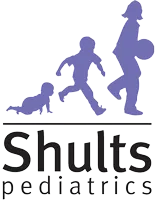
Welcome to week 2 of our All is Well Wednesday series! Today, we will talk about the 3 week visit. This may be just your second time in our office or you may have been for a lactation visit, weight check, or other concern. In addition to the exam, each well visit may include labs, survey, and/or immunizations. We will take a closer look at each of those categories for each visit.
- Labs: None
Before being discharged in the hospital, your baby had a newborn screen (NBS) completed to identify health conditions early and appropriate interventions. The results are sent to the state of Tennessee and then reported to us. We usually have these results by this visit.
There are 3 parts to the NBS:
- The critical congenital heart disease (CCHD) is a simple pulse oximetry test to screen for 11 heart conditions. Immediate referral to a pediatric cardiologist is warranted for babies who do not pass this screen. You would have been informed of this in the hospital.
- The newborn hearing screen is conducted prior to discharge or one month of age. Hearing loss is one of the most common abnormalities present at birth. Early detection, and therefore early intervention, can greatly improve the child’s social, motor, and cognitive development. For infants with identified risk factors, they will be periodically reassessed. For infants who do not pass the initial screen, it is repeated.
- Genetic Screening is the final portion of the NBS and is done with a blood sample for a heel stick collected after 24 hours old and before hospital discharge. This is done for every infant born in Tennessee and is sent to the state for genetic screening of over 70 genetic conditions that may not be apparent during routine physical exams or during the early weeks of life. Early identification of one of these conditions could indicate a need to change diet, medications, or other modifications that can be life saving. Sometimes, the genetic screen needs to be repeated. This could be due to collection error or other risk identified. A vast majority of these are normal on repeat or follow up. The state will contact our office directly if needed.
For more information on the newborn screening program, visit
https://www.tn.gov/health/health-program-areas/newborn-screening.html
- Immunizations: None.
We recommend individuals who have close contact with your baby, such as parents, older siblings, and grandparents, are up to date on their vaccines, especially pertussis (whooping cough) and seasonal flu.
- Surveys: If you have older children in the practice, you are most likely quite familiar with our portal and surveys that you are asked to complete prior to well visits. If you are new to our practice, you will soon also be quite familiar with surveys. You can access the portal at summitpediatrics.patientmedrecords.com.
Edinburgh Postnatal Depression Scale
After giving birth, it is normal for the mother to experience a wide range of emotions from joy and excitement to fear and sadness. These are typically most powerful during the first couple weeks, but for some new mothers depression can be longer lasting or can develop in the months after giving birth and is known as postnatal or postpartum depression. The pediatrician is often the first and most frequent point of contact for families and an essential piece of taking care of baby is taking care of mom. Therefore, at the 3 week, 2 months, 4 months and 6 months visits you will be asked to complete the Edinburgh Postnatal Depression Scale (EPDS). This is a short survey designed to identify mothers at risk for postpartum depression.
- Next routine well visit: 2 months.
Baby will have first immunizations at the 2 month visit. Do not give any acetaminophen (e.g. Tylenol) before this time. Call the pediatrician immediately for any fever (temp >100.4) or other concerns.
